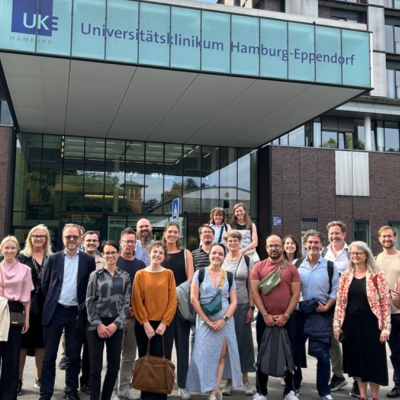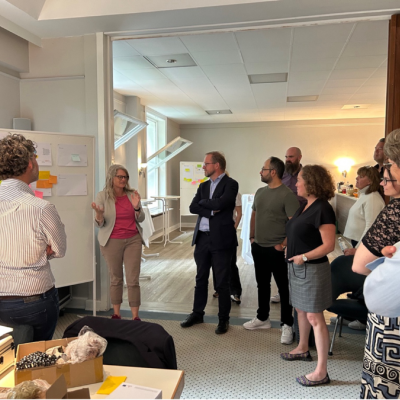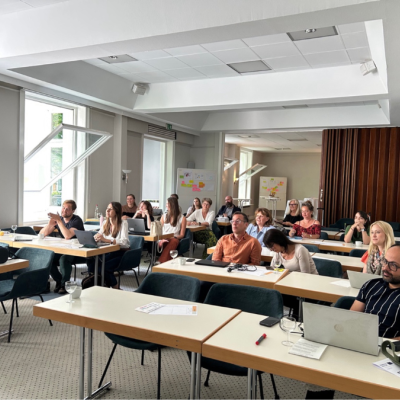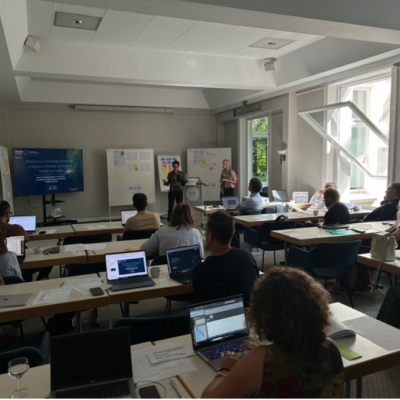Powering Europe’s digital health revolution, the DigiH4A partners recently convened in Hamburg to turn ambitious goals into concrete actions, focusing on how digital solutions can transform care for chronic conditions.
Back in June, partners from Sweden, Norway, Denmark, Belgium, the Netherlands, France, and Germany, gathered in Hamburg for a three-day meeting. The aim was to make significant strides in accelerating the integration of proven digital health solutions to improve care, efficiency, and outcomes across Europe. The project, funded by the European Union through the Interreg North Sea Programme, is addressing two major hurdles in digital health: establishing clear pathways for reimbursement and building real-world evidence to demonstrate the value of these innovations.
Focusing on real-world health challenges
A core theme throughout the meeting was the focus on specific real-world health cases, acting as practical vessels for the project's work. By grounding discussions in these tangible scenarios, the partners could better understand the potential impact and challenges of implementing digital health solutions. While still being refined, these cases will form the basis of the entire project's approach.
Here are some of the key health challenges being addressed:
Heart failure is a pervasive and debilitating chronic condition that places immense strain on healthcare systems globally. Managing this condition involves complex care pathways and significant resource allocation.
For example, in the Skåne region of Sweden, heart failure accounts for 80,000 patient days annually, incurring costs of nearly €50 million. Digital solutions offer substantial potential for cost savings and improved patient outcomes, though their full implementation still faces challenges. Similarly, heart failure is a major concern in France, particularly in its northern regions. Discussions have underscored the potential for scaling up digital solutions for this condition, despite ongoing reimbursement hurdles.
Mental health disorders represent a significant and growing global health challenge, impacting individuals' well-being, productivity, and overall societal health. A major aspect of this challenge lies in ensuring timely and accessible care, as many individuals face long waiting lists and underutilised resources, leading to prolonged suffering and increased healthcare costs.
In the Netherlands, for instance, 97,000 people are currently on waiting lists for mental health treatment. Despite the availability of digital solutions, their underutilisation contributes to an estimated annual cost of €300 million due to treatment delays. Effectively deploying these digital tools could alleviate the pressure on the healthcare workforce and improve patient access.
Chronic Obstructive Pulmonary Disease (COPD) is a progressive and life-threatening lung disease that significantly impacts quality of life and places a considerable burden on healthcare systems.
In France, COPD is a growing concern, partly due to factors like e-cigarette use. With 100,000 hospitalisations per year, each averaging 7.5 days, and accounting for 3.5% of the total health budget, digital interventions could play a crucial role. However, partners in France have highlighted a complex and bureaucratic reimbursement landscape, requiring digital solutions to robustly demonstrate their superiority in service delivery.
Chronic back pain is a widespread and debilitating condition that affects a substantial portion of the global population, leading to reduced mobility, diminished quality of life, and significant healthcare expenditures. A persistent challenge in managing this condition lies in inefficient referral pathways and the underuse of effective, less invasive treatment options, which can result in unnecessary procedures and prolonged disability.
In Central Denmark Region, around 17,000 patients are referred for diagnostic examination and treatment each year, yet only a small proportion receive specialised treatment, including surgery. At Aarhus University Hospital alone, approximately 7,500 patients with chronic back pain are referred annually for surgical assessment, but only about 10% are found to be suitable candidates for surgery.
Many referrals are returned due to missing information or a lack of surgical indication, creating wasted time for GPs and hospitals, frustration for patients, and increased costs for the health system. This overproduction of referrals highlights a significant inefficiency that digital health tools could help to address. A further obstacle for companies developing solutions in this area is the need to navigate differing evaluation criteria across Europe, as well as fragmented communication between primary, secondary, and specialist care.
Understanding reimbursement pathways
A core focus of the meeting was to study and understand the existing digital health reimbursement pathways across Europe. These pathways are highly fragmented: countries like France, Belgium, and Germany operate with more centralised systems, while Sweden and Denmark have more decentralised approaches.
The German DiGA (Digital Health Applications) model was highlighted as a potential example influencing discussions in other EU countries. While the DiGA fast-track diagram demonstrates a structured evaluation framework, it also comes with the challenges of prohibitively expensive and time-consuming evaluation processes.
The fragmentation and varying criteria across the EU remain a significant challenge for digital health solutions seeking broad market entry, which is precisely why DigiH4A aims to tackle these complexities by developing and testing novel reimbursement models.
Innovations and future directions
The partners also had the opportunity to visit University Medical Center Hamburg (UKE), where they learned about cutting-edge digital health initiatives. One compelling example was the Res@t app, designed to provide interactive digital support for children and adolescents with mental health issues. This app, currently undergoing a randomised controlled trial, aims to address the growing youth mental health crisis. The visit highlighted the challenges of bringing together diverse stakeholders like therapists, game developers, and commercial companies.
Another insightful presentation showcased Orpheus and ARGO from IDM gGmbH, a non-profit subsidiary developing AI for clinical use. With access to 7 million patient records, they've created ARGO to assist clinicians in writing reports and Orpheus for open-source speech-to-text transcription. These tools aim to save doctors significant time currently spent on administrative tasks (up to 10 hours per week on medical reports alone),setting an inspiring example for hospitals across the EU.
Looking ahead, DigiH4A will continue its deep dive into these cases, matching digital health solutions with optimal reimbursement pathways and developing a cost-benefit analysis tool. These activities will help ensure that innovative solutions are not only clinically effective but also financially sustainable. The insights gained from the Hamburg meeting are crucial in shaping the future of digital health adoption across Europe, ensuring that these innovations reach those who need them most.
Want to get in touch with the team? Send us an email!






